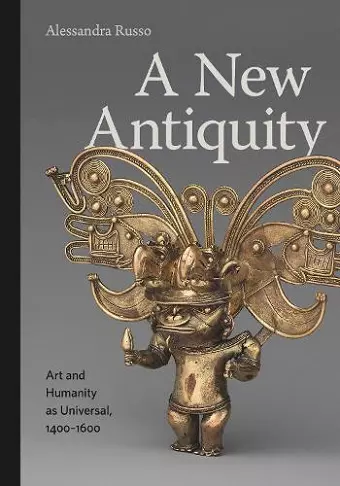A New Antiquity
Art and Humanity as Universal, 1400–1600
Format:Hardback
Publisher:Pennsylvania State University Press
Published:27th Mar '24
Should be back in stock very soon

Exploring the Transformative Power of New World Artifacts in Sixteenth Century Europe.
We tend to think of sixteenth-century European artistic theory as separate from the artworks displayed in the non-European sections of museums. Alessandra Russo argues otherwise. Instead of considering the European experience of “New World” artifacts and materials through the lenses of “curiosity” and “exoticism,” Russo asks a different question: What impact have these works had on the way we currently think about—and theorize—the arts?
Centering her study on a vast corpus of early modern textual and visual sources, Russo contends that the subtlety and inventiveness of the myriad of American, Asian, and African creations that were pillaged, exchanged, and often eventually destroyed in the context of Iberian colonization—including sculpture, painting, metalwork, mosaic, carving, architecture, and masonry—actually challenged and revolutionized sixteenth-century European definitions of what art is and what it means to be human. In this way, artifacts coming from outside Europe between 1400 and 1600 played a definitive role in what are considered distinctively European transformations: the redefinition of the frontier between the “mechanical” and the “liberal” arts and a new conception of the figure of the artist.
Original and convincing, A New Antiquity is a pathbreaking study that disrupts existing conceptions of Renaissance art and early modern humanity. It will be required reading for art historians specializing in the Renaissance, scholars of Iberian and Latin American cultures and global studies, and anyone interested in anthropology and aesthetics.
“A New Antiquity: Art and Humanity as Universal, 1400-1600 is an impressively seminal and ground-breaking study that will compel a rethinking of the heretofore existing conceptions of Renaissance art and early modern humanity.”
—Julie Summers Midwest Book Review
“Alessandra Russo fully restores the centrality of the plural notion of antiquity to the age of the first global interactions. Her reading of a range of writings by humanists, explorers, and missionaries subverts traditional accounts of the Renaissance and reveals how the material encounter with cultures and societies around the world led Europeans to theorize art as universal and redefine the human condition on this basis.”
—Giuseppe Marcocci, University of Oxford
“Alessandra Russo’s indispensable book excavates an early modern moment when the skill and exquisite beauty manifest in art objects from around the globe served as an argument for an ethics of universal humanity. Without losing sight of the violence of European colonialism, Russo mobilizes perceptive close readings of aesthetic encounters to reveal a countertradition that has much to teach us today. This deeply researched and eloquent undertaking promises to reorient fundamentally the history of the European Renaissance and of early modern art.”
—Rebecca Zorach, coauthor of Gold: Nature and Culture
ISBN: 9780271095691
Dimensions: 254mm x 178mm x 25mm
Weight: 885g
288 pages